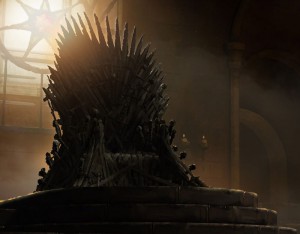Game of Thrones’ King’s Landing Could Use Some Separation of Church and State

Warning! Major Game of Thrones spoilers below.
HBO’s wildly popular Game of Thrones is back for a new season, which means more dragons, undead hordes, and political intrigue. But while the show and the book behind it are works of medieval fantasy, certain events which take place in the story have real-world relevance.
Perhaps the most relevant subplot has to do with the Sparrows, a religious movement that originates from one of the mainstream faiths of the realm (the Faith of the Seven) but which has distinguished itself through political maneuvering. Composed of a sect of humble yet fanatical clerics and their followers, the Sparrows seek to reform religious life in King’s Landing and throughout the realm by returning to lives of religious poverty, eschewing material items for a closer spiritual connection with their faith. They shun fancy clothing and acts of grandeur, instead dressing themselves in rags and devoting their time to feeding the poor and helping the weak.
In the last season of Game of Thrones, the leader of the Sparrows was appointed the High Septon, the leader of the Faith of the Seven, after the previous High Septon, an ostentatious man more concerned with wealth and power than with piety, was caught in a brothel. The new High Septon was not only given this powerful position by Queen Mother Cersei, regent for the young King, but was also allowed to recreate a religious military order.
Queen Mother Cersei didn’t give all of this authority and power to the Sparrows out of the goodness of her heart; she saw the Sparrows as a malleable constituency that would help prop-up the crown. She felt as though this collection of ascetics would both legitimize her family’s rule during a period of warfare and perhaps even serve as a loyal militia, assisting her with force if need be.
But blending church and state never works as planned, and the Sparrows, emboldened by their new legitimacy and military might, began to assume state functions.
The Sparrows start by attacking places “of ill repute,” such as bars and brothels. They then stomp out any religious opposition by arresting merchants selling idols of other gods or other religious texts. Next, they arrest the brother of Queen Margaery Tyrell and scion of House Tyrell, Loras Tyrell on charges of homosexuality. When Margaery lies about her brother’s relationships, she too is placed in prison.
Queen Mother Cersei herself is eventually arrested by the Sparrows for her long list of immoral acts (such as incest), and is thrown in prison along with the current queen and Loras Tyrell.
These three are imprisoned indefinitely in squalid conditions, and none receive fair, secular trials for their crimes. Even more shocking is the fact that the current King cannot visit his mother, wife, or brother-in-law without the approval of the new High Septon, effectively making the religious order—and not the monarchy—the arbiters of justice. Each of the prisoners is required to confess their sins to the High Septon or to other religious leaders, and is then punished before they are freed.
The most egregious punishment happens to Queen Mother Cersei, who is stripped naked and marched through the streets while being pelted with insults, rotten food, and feces. When the High Septon is confronted in the new season by the King for this barbaric treatment, the High Septon threatens the king by gesturing to his assembled religious military order before trying to talk the King into joining his side.
All of these events demonstrate the potential perils of establishing a state religion and ceding secular authority and government functions to a religious group. The empowered Sparrows dispense religiously motivated justice to the rest of the world and become dangerous when given military support. What the noble families must now do if they wish to wrest control of the government from these fanatics is to explicitly separate church from state, and to prohibit any religious order from carrying out the functions of the state. That means no more faith-based legal system, no more private religious militias, and no state-supported official religion or state-endorsed religious leaders.
The fictional continent of Westeros where Game of Thrones is set is already a cruel, violent place. Allowing religious fanatics to run amok only makes things worse for the religious minorities and marginalized communities whose even existence is an affront to the Sparrows.
